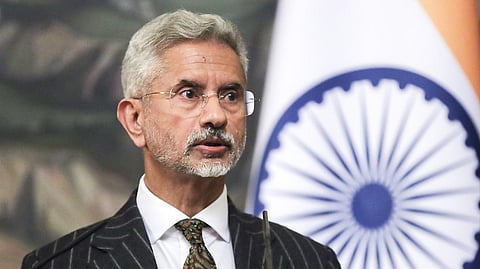‘Double standards are clearly in evidence’: Jaishankar at G20 Foreign Ministers’ meeting
As Western nations increasingly target countries maintaining economic ties with Russia, including India’s oil imports, Jaishankar warned against politicising essentials such as energy.

External Affairs Minister Dr S Jaishankar (File photo | AP)
NEW DELHI: External Affairs Minister S Jaishankar delivered a stark critique of global power dynamics on Thursday, calling out double standards in international responses to energy access while urging the world to reform multilateral institutions and show zero tolerance for terrorism. He was speaking at the G20 Foreign Ministers’ meeting on the sidelines of the United Nationals General Assembly (UNGA).
“Apart from jeopardizing supplies and logistics, access and costs themselves became pressure points on nations. Double standards are clearly in evidence,” he said. “Our focus today is on the correlation between international peace and global development. In recent times, that is well established as both deteriorated in parallel. The costs, especially to the Global South in terms of energy, food and fertilizer security were starkly demonstrated.”
As Western nations increasingly target countries maintaining economic ties with Russia, including India’s oil imports, Jaishankar warned against politicising essentials such as energy: “Making energy and other essentials more uncertain in an economically fragile situation helps no one.” He argued that development cannot be sacrificed in the name of peace, cautioning against punitive economic policies that only deepen instability.
“Peace can certainly enable development; but by threatening development we cannot facilitate peace. The way out is to move the needle towards dialogue and diplomacy, not in the opposite direction towards further complications,” he urged.
Positioning India as a potential bridge-builder in global conflicts, Jaishankar said that countries with access to both sides must be recognised for their role in enabling and maintaining peace.
“In any conflict situation, there will be a few who have the ability to engage both sides. Such countries can be utilized by the international community, both to achieve peace and to maintain it thereafter,” he said.
Turning to the persistent threat of terrorism, Jaishankar called for a united global front, insisting that complacency or selective silence on terrorism undermines collective security: “It is imperative that the world display neither tolerance nor accommodation to terrorist activities. Those who act against them on any front actually render a larger service to the international community.”
Jaishankar also stressed on the pressing need to reform global institutions, particularly the United Nations, citing its visible shortcomings in managing today’s crises. “The limitations of multilateralism and the United Nations in particular are visible. The need for reforming multilateralism has never been greater,” he said.
“The international situation is both politically and economically volatile. We, as members of the G20, have a particular responsibility to strengthen its stability and give it a more positive direction – through dialogue and diplomacy, by combating terrorism, and by ensuring stronger energy and economic security,” he added.
The New Indian Express
www.newindianexpress.com
